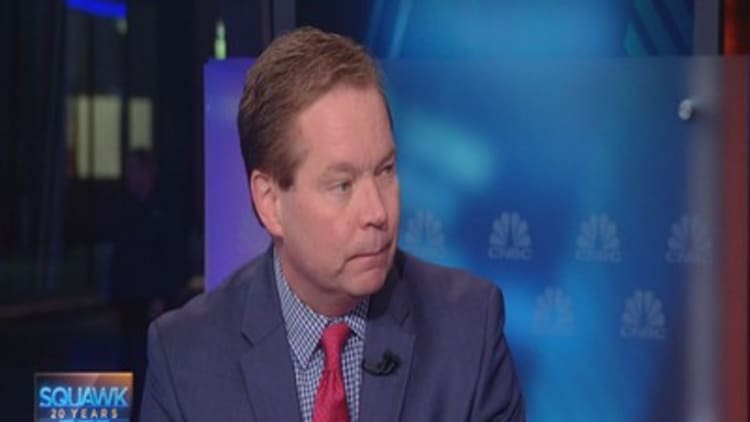


Moody's sharply lowered its oil price assumptions on Tuesday, amid a threat of a prolonged oversupply.
On Tuesday morning, Moody's Investors Service said it had "significantly lowered" its price assumptions for Brent crude and West Texas Intermediate crude as continued high levels of production by global oil producers have "significantly exceeded" growth in oil consumption.
Moody's lowered its price assumption in 2016 for Brent crude oil, the international benchmark, to $43 from $53 per barrel and for West Texas Intermediate (WTI) crude, the North American benchmark, to $40 from $48 per barrel.
Looking further ahead, the rating's agency expected both Brent and WTI prices to rise $5 per barrel in 2017 and 2018.
Those prices seem a far cry from current levels, however. On Tuesday, WTI was trading at $36.22 and Brent crude at $37.75. Oil prices have been battered by a glut in global supply, mainly caused by record production by OPEC nations, and demand failing to keep up.
'Prolonged oversupply'
Despite oil prices falling from a high of $114 last June to current levels, OPEC has refused to cut production, preferring instead to maintain its market share and drive out rival U.S. shale oil producers who have higher production costs.
The strategy has worked with U.S. shale oil industry witnessing the cancellation of drilling projects and weekly closures of oil rigs. Other non-OPEC members such as Russia have also experienced economic turmoil and recession caused in no small part by the decline in oil prices. Still, Russia and others have not been keen to cut their own oil output to support prices, and the glut in supply has continued apace.
With the prospect of international sanctions being lifted imminently on OPEC member Iran, which is keen to get its oil industry running at full capacity again, that glut could only worsen, Moody's said.
"The potential lifting of Iranian sanctions could add significant supply to the market in 2016, offsetting or even exceeding expected declines in U.S. production." The rating agency said this will lead "to a prolonged period of oversupply that will continue to keep oil prices low."
"OPEC oil producers continue to produce without restraint as they compete for market share, exacerbating the currently saturated markets," Terry Marshall, a Moody's senior vice president said in the agency's report.
"Russia has also greatly increased production, and the possibility that sanctions will be lifted on Iran in 2016 could flood the market with even more supply."
Supply and demand
Looking further ahead, Moody's significantly reduced its medium-term price assumptions for Brent and WTI, to $63 per barrel and $60 per barrel, respectively, saying the reductions "reflect the rating agency's view that the supply-demand equilibrium will eventually be reached at around $63 per barrel for Brent, but only at the end of the decade."
Moody's forecast that global oil demand will rise by roughly 1.3 million barrels per day in 2016, an increase from its previous assumptions as oil consumption picks up in countries such as the U.S., China, India and Russia.
However, ongoing increases in OPEC oil production have offset growing global demand and led to a rapid build-up of oil inventories, Moody's cautioned.
In October, inventories in the Americas, Asia and Europe stood at 4.4 billion barrels according to Energy Intelligence, compared with 3.8 billion-3.9 billion barrels in the last five years.
Mary Jo Jacobi, crisis management expert and former assistant U.S. Secretary of Commerce, told CNBC Tuesday that while lower oil prices were good for consumers, the oil industry would continue to struggle.
"I would be shocked by that (lower oil prices) but then we continue to be surprised by how low it goes. I don't see anything out there that is going to bring the price up in the near-term. And with OPEC deciding not to cut production, you can shut up your wells, you can shut up your production but the problem is still there. Storage has become a big problem" she told CNBC Europe's "Squawk Box."
"For the producers and oil services firms, it's a very big challenge."



